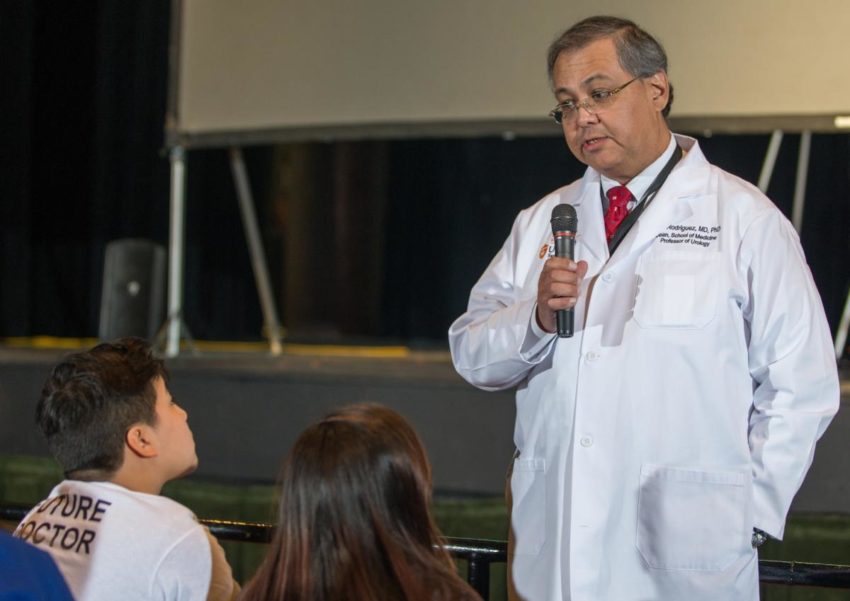An estimated 200 health careers students at McCollum High School on the South Side listened attentively as Dr. Ronald Rodriguez spoke about his origins and the perseverance it took to leave behind his childhood friends in South Texas to attend the Massachusetts Institute of Technology (MIT). Dr. Rodriguez is professor of urology and interim dean of the Joe R. and Teresa Lozano Long School of Medicine at UT Health San Antonio.
The occasion was National Doctors’ Day, March 30, and Dr. Rodriguez was among two dozen UT Health San Antonio physicians who fanned out across the city to speak to young people about the road to medicine, a road that frequently has obstacles, always has excitement, and offers a lifetime of rewards in saving and changing patients’ lives.
Dr. Rodriguez’s success at MIT led to his completing the physician-scientist M.D.-Ph.D. program at Baylor College of Medicine in Houston, and he followed that with residency and fellowship training in urologic oncology at the prestigious Johns Hopkins University School of Medicine in Baltimore. He was at Johns Hopkins for more than 20 years, including 13 years on the faculty, before returning to San Antonio and UT Health in January 2013.
Dr. Rodriguez grew up in a home less than a mile from McCollum, he said. He attended schools in the area before his parents moved to Lytle, south of San Antonio, when he was 14. He attended McCollum as a freshman.
Tejano music star Emilio Navaira was his best friend from age 6 to 14. As a teenager, Dr. Rodriguez played weekends at clubs, dances and concerts. He then got very involved in math and science in high school, and that led him on the path of going to MIT. In New England he switched his major to molecular biology.
He reminisced about Emilio, recalling that the star had a tragic bus accident about a decade ago. Emilio died of a heart attack in May 2016. “Tejano lost two of its brightest stars – Emilio and Selena – too young,” he said. “I am proud to say Emilio was my friend.”
He and Emilio both went to college after high school while most of their friends did not. Dr. Rodriguez recalled coming home from Boston on a break from MIT and his mother showing him newspaper clippings. A drug sting had caught eight or nine of his closest friends, and he knew everyone who was arrested.
“That could have been me, that could easily have been me,” Dr. Rodriguez told the students.
A career in medicine and research led him far away from those influences. Success soon followed. Early in his career, Dr. Rodriguez discovered a pathway to explain the way steroids work, and in the 1990s he helped create the first genetically engineered adenovirus designed to kill cancer.
Today, the urologic cancer team at UT Health San Antonio performs more advanced kidney cancer surgeries than any center nationally, with a high degree of success and patient survival, he said.
Dr. Rodriguez told the students that it takes commitment, discipline, hard work and passion to become a physician.
As a Latino coming from South Texas to New England, he faced misconceptions. After Dr. Rodriguez turned in a strong essay that was a large part of a course grade, the professor said he was going to fail Dr. Rodriguez. The professor did not see how an 18-year-old from South Texas could have written such a good essay.
“I showed him my notes and sources, and he passed me. He should have given me an A. That’s the nature of how we are looked upon. He never apologized,” Dr. Rodriguez said.
Dr. Rodriguez recalled feeling guilty at MIT for having conveniences, such as a cook for his housemates and him. That was an amenity his parents on a dirt farm in Lytle didn’t have, he said.
Of 80 Latinos in his entering class at MIT, only four finished, he estimated. Many times he thought he couldn’t do it, either, he said, but his mother always believed in him. “And I hate to lose. I refused to lose,” he said.
“That level of resiliency – grit – is one of the leading factors of success,” he said.
UT Health has been sending physicians and other faculty to area schools on Doctors’ Day for a decade. It’s part of an educational pipeline to find the next physicians for South Texas.
The activity is needed, as Bexar County itself has U.S. Census tracts that are designated Health Professional Shortage Areas (HPSAs) by the U.S. Health Resources and Services Administration.


